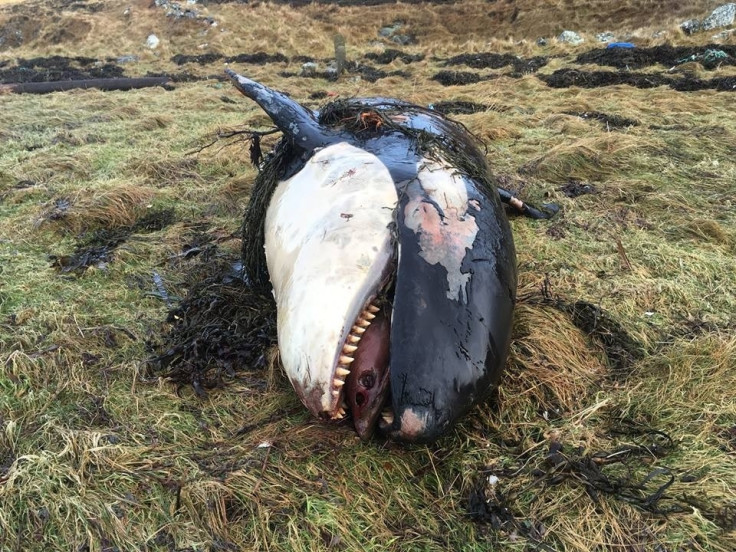Killer whale dies in field after being thrown 25 metres inland by Storm Caroline
A post-mortem by the Scottish Marine Animal Strandings Scheme said the orca was healthy before his death.

A killer whale is believed to have died after being thrown 25 metres inland by the force of Storm Caroline earlier this month.
Orcas are very rare in Scotland with a small native population that can be spotted near the west coast of the Shetland Islands.
Tragically the population was reduced earlier this month when a young male was found on a grassy shoreline close to Eshaness after gale force winds.
The three-metre long calf, believed to be around four years old, was likely separated from its mother and pod by the weather before being thrown far inland by the strong waves and winds.
A post-mortem conducted by Andrew Brownlow from Scottish Marine Animal Strandings Scheme (SMAS) concluded the young juvenile was alive before the stranding.
A Facebook post by Hillswick Wildlife Sanctuary said the orca was "alive, healthy and had recently consumed a seal when it stranded in the sheltered bay at Hamnavoe".
It read: "Such a sad end for one of the young orcas that have been inspiring whale watchers throughout these islands for the past couple of years."
Orca post mortem in Eshaness, ShetlandYesterday we discovered the young killer whale that we found in Eshaness two weeks ago had died after being thrown high up on the shoreline by the ferocious Storm Caroline. Andrew Brownlow from Scottish Marine Animal Strandings Scheme carried out a post mortem with a small group of helpers on what proved to be a perfect day with clear skies above us, which was a miracle in itself considering the weather we've been having lately. It took Andrew and his Shetland team three hours to dissect the whale and collect samples for analysis. By the end he concluded it had been a young juvenile, perhaps four years old, who was alive, healthy and had recently consumed a seal when it stranded in the sheltered bay at Hamnavoe, washed up by the 100mph hurricane that suddenly struck Shetland on the afternoon of Thursday 7 December. Such a sad end for one of the young orcas that have been inspiring whale watchers throughout these islands for the past couple of years. Local crofter Magnus Nicolson buried the whale, its skeleton to be recovered later for analysis and display, hopefully here in Shetland.#orca #killerwhale #StormCaroline #postmortem #Eshaness
Posted by Hillswick Wildlife Sanctuary on Thursday, December 21, 2017
The orca stranding is especially tragic because young killer wales are extremely rare in northern Europe, the sanctuary said in an earlier post.
A walker found the carcass after the huge winds battered the islands and it becomes the second dead whale fund on the islands after a female was discovered on the uninhabited isle of Linga in January.
It is believed the recent orca death may have been due to dehydration or he may have been crushed by his own body weight once out of the water.
On Thursday we were called out to find a second dead killer whale washed up on Shetland's coastline this year. In...
Posted by Hillswick Wildlife Sanctuary on Sunday, December 17, 2017
The autopsy of the animal was posted to Facebook users expressed their dismay, Annie Davidson wrote: "Not another! Desperately tragic to lose another member of the pod, especially a youngster."
While Charlee Butler added: "How awful to lose such a beautiful creature so young."
In May this year it was revealed that a female killer whale named Lulu died with the highest level of a class of banned chemicals in her blubber of any animal ever reported in the UK.
Lulu, who was found on the Isle of Tiree in the Hebrides, Scotland, had 957 mg of the toxic manmade compound polychlorinated biphenyls (PCB) per kg, more than 100 times the estimated safe limit.




















